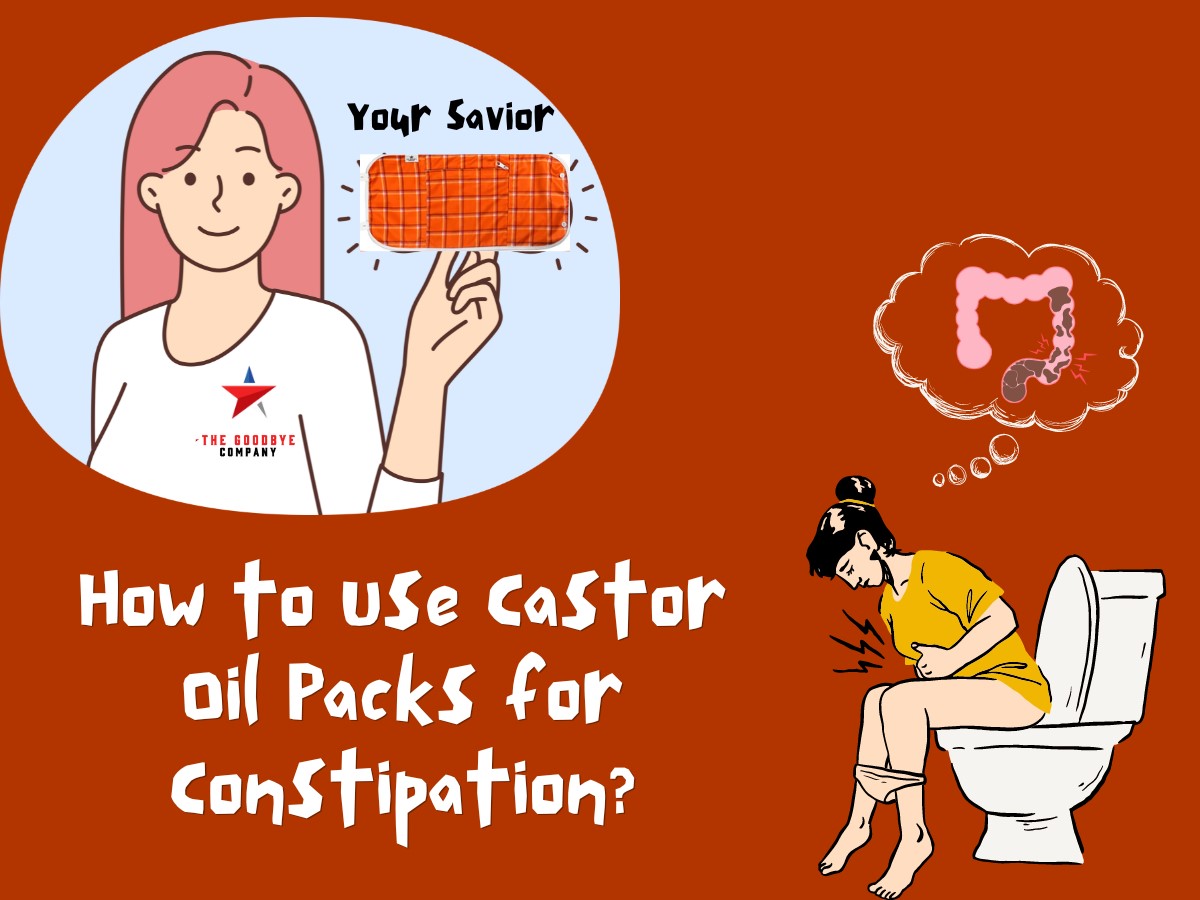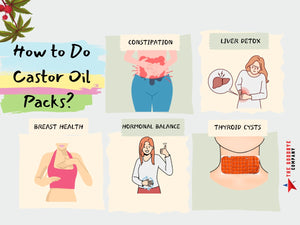Castor oil is a potent stimulant laxative; its oral use for constipation is FDA-approved, but many people may be allergic to and irritated by it. That is why castor oil packs came into being. They are YOUR SAVIOR for constipation. Castor oil packs are the safest, most convenient, and most useful devices you can quickly place on any body part for several holistic benefits. Scroll below to learn “How to Use Castor Oil Packs for Constipation?”
What is Constipation? Why You Need to Address it ASAP?
Constipation is not just a symptom; it is the mother of diseases that stem from minor digestive problems such as reduction in bowel movements, pain during defecation, or difficulty passing hard stool. It can be acute or chronic, which means that you may get constipated for a short term owing to the changes in your lifestyle or have to cope with it all the time due to an underlying chronic illness causing constipation.
There are two main types of constipation:
- 1. Primary constipation
- 2. Secondary constipation
Primary constipation is also known as functional or idiopathic because it occurs due to a problem in the structure and function of the digestive system or may have no cause at all. It does not occur due to an underlying issue. It can be:
- Normal Transient Constipation
- Slow Transient Constipation
- Outlet Constipation
|
Normal Transient Constipation |
Consistency and defecation rate is normal, but the patient feels abdominal pain and bloating. |
|
Slow Transient Constipation |
It rarely occurs in females of middle age and involves slow bowel movements; stool stays in the intestines longer. |
|
Outlet Constipation |
Damage to the pelvic floor muscles or nerves causing: ● Delayed bowel movements ● Straining while emptying ● Needing to use hands to assist bowel movements |
Secondary constipation occurs due to an underlying health problem. It means that many diseases affect normal digestion; these are:
- IBS
- Diabetes
- Hypothyroidism
- Depression
- IBD: Crohn's disease and Ulcerative colitis
- Nutritional deficiency
- Anal fissures
- Multiple sclerosis
- Colon cancer
So, you need to address constipation, whether it's acute or chronic or primary or secondary, for the following reasons:
- Relief from pain, discomfort, and bloating
- Preventing complications like hemorrhoids, rectal prolapse, anal fissures, and fecal impaction
- Preventing bowel obstruction- a medical emergency
- Improving the quality of life with no discomfort interfering with the daily routine
- Identifying underlying health issues such as thyroid disorders, IBS, IBD, chronic liver disease, etc.
You're Pooping, But The Doctor Says Constipation- Why?
You may be pooping, but your doctor says you are constipated. It's true for the following reasons:
- Incomplete evacuation
- Feeling of fullness
- Hard stools like rocks and pebbles
- Straining during bowel movements
- Infrequent bowels
- Abdominal cramping
- Bloating
- Gas
- Nausea
From this picture, you'll get to know what different types of poops and constipation look like.
How Often Should You Have a Bowel Movement?
There's no standard number of bowels to say that it's normal to have this many poops. Some people go to the toilet about three times daily, while others go about three times weekly. It depends on the bowel habits, diet, lifestyle, emotional state, and other physiological and environmental factors. However, research says that men poop more than women. According to some studies, men have their poop in about 1.7 days, while most women get it in 2.5 days. That is quite a long time. But honestly, many men and women poop every day, and I think it's good because what goes in must come out the same day, or it will get plugged or hard.
3 Simple Ways to Relieve Constipation
These are the three simple ways to relieve constipation any doctor would recommend.
Lifestyle Changes
Lifestyle changes you must incorporate into your routine include exercises, yoga, and meditation. It also means scheduling your daily routine, like waking up early and going to bed early, as “Early to bed, early to rise, makes a man healthy, wealthy, and wise. Waking up early in the morning and walking on fresh green grass improves health and reduces stress. As stress causes inflammation and contributes to emotional constipation, reducing stress levels may help you eliminate this ‘mother of diseases.’
Fluids and Fibers Fill up the Toilet
Dietary modifications are part of lifestyle changes. To emphasize the importance of diet, it is mentioned as a separate way to relieve constipation. This is also because even if you don't change your sedentary lifestyle but eat a healthy diet full of dietary fiber and probiotics, you can significantly reduce the recurrence of constipation.
Dietary fiber is a plant-based fiber that is not soluble in the body but adds mass and volume to the roughage for easy expulsion. Fluids, on the other hand, are crucial to softening the hard mass into soft stool. Therefore, add more fibers and fluids to your plate. It's an easy mnemonic to remember: “Fluids and Fibers Fill up the Toilet.”
Castor Oil Packs
Castor oil packs are easy-to-apply gadgets made exclusively to avoid messy castor oil applications for various health benefits. These packs can be applied to the abdomen, arms, ankles, breasts, and neck. Though you can make these packs at home, buying the ready-made ones is more convenient and valuable.
Remember to always buy packs made with soft, organic cotton or wool flannel from the inside and certified polyester from the outside to avoid leakage. You can also go for additional features like an adjustable elastic strap with button closure and a pocket for the hot or cold pack. Try my favorite castor oil packs, and you will never leave them.
How Castor Oil Packs Relieve Constipation- The Science Behind The Therapy
Castor oil contains about 80-90% ricinoleic acid, a potent stimulant, laxative, and anti-inflammatory. When you apply castor oil packs on your abdomen, after absorption into the skin and gut tissues, ricinoleic acid binds to the EP3 receptors, the subtypes of prostaglandin receptors in the smooth muscle cells. The activation of these receptors stimulates smooth muscle contractions that help with excretion. Ricinoleic acid also activates TRPV1 receptors- the ion channels in smooth muscle cells and nerve endings that lead to calcium influx and smooth muscle contractions.
Ricinoleic acid also stimulates intestines' fluid secretion, which helps soften the roughage and ease defecation. Some studies also suggest that ricinoleic acid activates the parasympathetic nervous system, ‘ The Rest and Digest System,’ reducing stress (another contributing factor of constipation) and promoting relaxation. Castor oil packs also effectively break down the protective biofilm the conbiotics (bad bacteria) develop to protect them from being killed. Breaking the film helps kill the bad bacteria quickly, reducing abdominal gas, bloating, and pain.
Moreover, COP helps preserve glutathione stores, potent antioxidants that help remove toxic wastes and heavy metals from the body. Though there is limited scientific evidence to prove the mechanism of action of COP in relieving constipation, anecdotal evidence and the experience of people practicing Ayurveda still support and recommend it for several health benefits.

This paper demonstrates that castor oil packs (COPs) relieve constipation and significantly reduce symptoms (e.g., straining while defecating and feeling evacuated after defecation). Many other scientific studies also support the use of COPs in improving digestion and patients' quality of life. However, scientists still demand more research to reveal this therapy's magical benefits and potential challenges.
How to Use Castor Oil Packs for Constipation?
It's easy and simple- let's begin!
Gather Supplies:
- Castor oil pack (with ultra-absorbent organic cotton inside and leak-proof certified polyester outside)
- Castor oil (Jamaican Black and Gold exquisite castor oil blend)
- Hot pack
- Plastic wrap or cling-film
- Old towel or rug
Follow these Steps:
- Take your good-quality castor oil pack, wash it, and rinse it to improve its oil absorptivity.
- Place the pack on a desk and pour about a tablespoon of the finest-quality castor oil into the center of the pack. Avoid the edges to avoid the mess.
- Then, prepare yourself by washing and rinsing your abdominal skin. This is to ensure that no moisturizer or body oil is on your skin, for it may decrease the absorption of castor oil into the skin; also, spread an old towel or a rug on the couch or sofa where you will lie or sit.
- Put the pack on your abdomen, adjust the straps to fit the pack snugly around your waist, and close the button. Now, you can either do your home tasks while applying the pack or meditate while lying down with the pack.
- You can also either place a hot pack in your castor oil pack (my castor oil pack has a pocket) or just use a heating pad. For the heating pad method, you must first wrap your pack with a plastic sheet or cling film to retain the heat inside the pack or avoid oil stains and then place the pad.
- Relax, meditate, or do deep breathing exercises while applying the pack for 30-60 minutes. Depending on your needs and body response, you can do sessions like these multiple times weekly.
- Remove the pack, wash, rinse, dry, and save it for later use.
How Often to Do Castor Oil Packs for Constipation?
The frequency of using castor oil packs depends on your preferences, needs, and your body's response to this holistic approach. Typically, you can apply the pack PRN (as needed whenever you feel constipated or bloated) for mild or occasional constipation. A safer dose is to use the packs once or twice monthly- just to oil your gut machinery. Chronic constipation usually takes longer to heal, so you can use these packs twice or thrice weekly, depending on the results you are getting.
Suppose you are trying castor oil packs for the first time or are already on the way to managing your chronic illness, i.e., taking dietary fiber, exercise, and OTC laxatives. In that case, you may not need to apply them frequently. In short, always start with a lesser dosage frequency and alter the number of applications as per results. But remember, as this therapy is topical and only a fraction of the active principle goes to the site to perform its action, the more, the better.
FAQs
Why can’t you only drink castor oil to relieve constipation?
Castor oil is indeed a potent laxative, and its use against constipation is FDA-approved. You can take about 15 ml or three teaspoons of castor oil to relieve short-term, occasional constipation or as directed by your physician.
Since castor oil has an unpleasant taste, you may need to add it to milk, fruit juices, or coffee. But remember that castor oil is also an irritant, and it may irritate the mucosa of your mouth and gut lining. Therefore, drinking castor oil may not be a good idea. There are several other reasons for that, too.
- Potential side effects (cramping, nausea, diarrhea, dehydration, electrolyte imbalance)
- Dependency (regular use weakens smooth muscle contractions, and your intestines begin depending on laxative or stimulant action)
- Masking underlying issues (you will be taking castor oil orally to induce bowels, but it may mask the root cause, i.e., IBS, chronic liver disease, thyroid disorders, or intestinal blockage)
- Overlooking safer options (dietary fiber, probiotics, exercises, castor oil packs, OTC laxatives)
What to expect after castor oil pack for constipation?
After consistently using castor oil packs, expect a reduction in the severity and recurrence of your abdominal pain, cramping, and bloating. You may also notice increased bowel movements and improved digestion.
Can you put castor oil in the anus for constipation?
It is not as safe as it seems to put castor oil into your anus for constipation. It is not a standard method either and can potentially cause irritation or discomfort in your intestines. This is because castor oil works by stimulating smooth muscle contraction. Putting it directly on your muscles may cause a loss of control for a regulated response, resulting in side effects.
Nevertheless, castor oil is used in hospitals as an enema, and all this work is under the supervision of an HCP. What you can do at home is apply a castor oil pack on your abdomen or add a few oil drops to your belly button, ensuring both safety and effectiveness.
Where to put castor oil pack for constipation?
For constipation, place your castor oil pack in your stomach area. You can cover the entire abdomen, from just below the sternum to the lower abdomen. This coverage will not only help relieve constipation but also aid in detoxifying the liver, gallbladder, kidneys, and ovaries.
Can you put castor oil in the belly button for constipation?
Yes, you can pour a few drops of castor oil into your belly button and do a quick circular massage. According to conventional medicine literature, the belly button is the center of the torso and channels and regulates energy to all body parts. Therefore, putting castor oil into the belly button helps regulate bowel movements and gut fluid levels, relieving constipation.
Can you leave the castor oil pack overnight?
There is no definite or standard period for leaving the castor oil pack on your body. Some people prefer to apply it for 30-60 minutes, while others love to relax overnight or for 24 hours.
For constipation, you should place the pack according to the severity of your constipation or safely for about an hour; placing it overnight may lead to excessive absorption of ricinoleic acid into the abdomen, causing strong peristalsis, cramping, or spasms. The situation may even cause diarrhea due to overly enhanced bowel movements. It's better to consult an HCP for an accurate duration and frequency of castor oil pack application.














